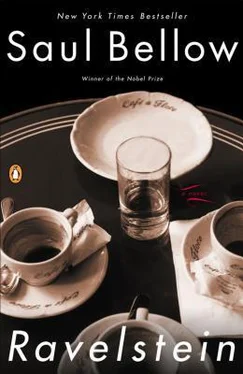He and Nikki slept on Pratesi linens and under beautifully cured angora skins. He was perfectly aware that all this luxury was funny. Under charges of absurdity he was perfectly steady. He was not going to have a long life. I'm inclined to think he had Homeric ideas about being cut down early. He didn't have to accept confinement in a few dead-end decades, not with his appetite for existence and his exceptional gift for great overviews. It wasn't the money alone-his great best-seller windfall-that made it possible; it was his ability proven in the mental wars-the positions he held, the fights he provoked, his disputes with Oxford don classicists and historians. He was sure of himself, as de Gaulle had said about the Jews. He loved polemics.
Rosamund and I lived just up the street in a building that reminded you of the Maginot Line. Our rooms weren't as splendid as Ravelstein's monastic-luxurious apartment. They were boxy, but I had been looking for shelter just then. I was bombed out-evicted after twelve years of marriage from what had been my uptown home, and I was lucky to find sanctuary in one of the concrete pill boxes down the way from Ravelstein, about fifty yards from his wrought-iron midwestern gothic gate and his uniformed door man.-We had no doorman.
What I had were some fifty years of walking these sun-striped pavements, past buildings once occupied by friends. Now here, where a Japanese theologian was the tenant today, a Miss Abercrombie had lived forty years ago. She was a painter who had married a pleasant hippie burglar whose specialty was to entertain company by re-enacting second-story break-ins. On every one of the surrounding streets there were front rooms where friends had lived-and at the sides, the windows of bedrooms where they died. There were more of those than I cared to think about.
At my age, you don't want to be too tender-minded. It's different if you lead an active life. And I am active, on the whole. But there are gaps, and these gaps tend to fill up with your dead.
Ravelstein credited me with a kind of simpleminded seriousness about the truth. He said, "You don't lie to yourself, Chick. You may put off acknowledgment for a very long time but in the end you do own up. It's not a common virtue."
I am by no means a professor, although I've been around the University community for so many decades that some of the faculty think of me as a longtime colleague. And when I walked out on one of those sun-printed days shortly after I had returned to the University neighborhood, the weather dry, cold, clear, and high, I met an acquaintance named Battle. He was a prof, an Englishman who strode about the freezing streets in an old thin topcoat. A man in his sixties, he was big, ruddy, fleshy, his huge chilled face as thick as sweet red pepper. His hair was dense and long, and he sometimes reminded me of the Quaker on the oatmeal box. He had energy enough to keep two men warm. Only his raised shoulders acknowledged that the temperature was well below freezing-the shoulders up, and the hands thrust down into his coat pockets-all but the thumbs. His feet were set close together. He was not what we used to call "a sport" but he always wore classy shoes.
Battle was said to be a man of immense knowledge. (I had to take people's word for this-how would I know about his command of Sanskrit and Arabic?) He was not an Oxbridge type. He was a product of one of England's redbrick universities.
In a case like his you couldn't simply mention that you had run into a prof named Battle whose long hair made hats superfluous. In World War II, Battle had been a paratrooper, and a pilot as well. He had ferried de Gaulle across the Mediterranean once. Besides which, he had been a notable tennis player in civilian life. He had also taught ballroom dancing in Indochina. He was very quick on his feet, an astonishing runner who had chased and caught a mugger. He punched the mugger so hard in the guts that the cops had to send for an ambulance.
Battle, one of Ravelstein's favorites, was fond of good old Abe. But to say how he, Battle, saw Ravelstein was well-nigh impossible. There were no clues as to what went on behind that powerful fore head. Full of force it came down to the bristling overhang of a superorbital ridge intersecting the straight line of his nose and matching the tight parallels of his lips-the mouth of a Celtic king.
He might have been trained as an Olympic-class weightlifter. This was a very strong man-but to what end was he strong? Battle brushed aside his natural gifts. Subtlety was what he aimed at-hidden, complex, bold, secret Machiavellian moves. His purpose might be to frustrate a departmental chairman by influencing an in different dean to pass a word to the provost, et cetera. No one would ever suspect such conspiracies existed, much less care to discover who was behind them. Ravelstein, who explained all this to me, in coherent with laughter and crying "thee-ah, thee-ah," said, "He comes to discuss all kinds of personal, highly personal thee-ah things with me but never mentions those other operations."
With a little encouragement Ravelstein would reveal Battle's confidences-or anyone else's. He would say, quoting a late friend of ours, "When I do it, it's not gossip, it's social history."
What he really meant was that idiosyncrasies were in the public domain, to be enjoyed like the air and other free commodities. He wasted no time on psychoanalytic speculation or the analysis of everyday life. He had no patience with "this insight bullshit" and preferred wit or even downright cruelty to friendly, well-meant interpretations of the conventional, liberal kind.
In the cold, sunny street-his face all folds in the whipcrack cold-Battle said, "Is Abe receiving visitors, these days?"
"Why not? He's always glad to see you."
"I didn't say it right…. He's always polite to Mary and me.'
Mary was a plump, witty, short, smiling woman. Ravelstein and I were particularly fond of Mary.
"Well, if you are welcome and he's nice to you, what's the question?"
"He's not in the best of health, is he? '
"He's one of those tall, strong, always ailing men."
"But isn't he more ailing than usual?"
Battle was testing me, hoping for hints about Ravelstein's condition. I wasn't about to tell him anything, though I knew he liked Ravelstein-looked up to him, somehow. With odd people I can go along so far and no farther. Each frosty breath through Battle's dramatic nostrils rushed more red into his face. The color went down as far as the accordion pleats under his chin. He seldom wore a hat. His black hair seemed to keep the back of his neck warm enough. He wore a tango dancer's shoes. I sympathized with his eccentricities. It seemed to be a mixture of hold-tight delicacy and flyaway brutality.
The Battles, man and wife, valued Ravelstein highly. They felt for him. You could be certain that they had frequent conversations about him.
"Well," I said, "he has had a series of infections. The shingles hit him hard."
"Herpes zoster. Of course," said Battle. "Inflammation of the nerves. Horribly messy and painful. It often hits the spinal and cranial nerves. I've been around such cases."
His words made me see Ravelstein. I saw him lying silent under his down quilt. His darkened eyes were recessed. His head was set on its pillows. His posture suggested rest. But he wasn't getting any rest.
"Got over that one, did he?" said Battle. "But hasn't he been hit by another? Something new?"
There was another. This next infection was called Guillain-Barrй by the neurologists when they finally identified it. It hadn't yet been diagnosed, just then. Abe had flown back from Paris for a dinner in his honor given by the mayor. Black tie and celebrity speeches-just the kind of occasion that Ravelstein, long starved for recognition, couldn't say no to. In Paris, where he intended to spend his sabbatical year, he had taken an apartment on an avenue of embassies and official residences very close to the Elysйe Palace. The police were always around, and coming home at night presented a problem, since Abe couldn't find the time to waste at the bureaucratic Hotel de Ville applying for a _carte de sйjour__, so that when the cops stopped him for his identity papers he had none to show and there were long midnight discussions. He referred the police to the Marquis of Such and Such, his landlord. There was something to be said for everything that happened in these streets. Even the inconveniences in Paris were on the highest level. Compared to his real troubles, these Corsicans (Ravelstein believed that all _flics__-French cops-came from Corsica, that no matter how close they shaved, their chins still bristled) remained in every respect entertaining.
Читать дальше












